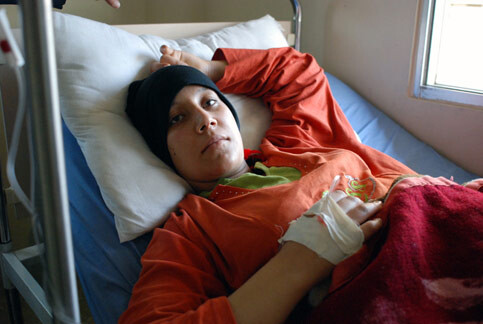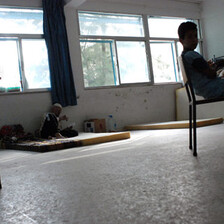Baddawi Refugee Camp 28 May 2007

A 16-year-old girl from Nahr al-Bared receives treatment after being wounded when her family left Nahr al-Bared camp on Thursday, 24 May 2007. (Tanya Traboulsi)
Over the weekend Rasha Moumneh and I traveled (again) to the al-Baddawi Palestinian refugee camp near the northern coastal city of Tripoli, a Sunni (read: Rafiq al-Hariri) stronghold with strong ties with the pro-Western Lebanese government. Since the fighting between the Lebanese security forces and Fatah al-Islam began one week ago, the Baddawi camp has swelled with an influx of some 15,000, refugees filtering in from the Nahr al-Bared refugee camp, scene of the fighting.
As has been reported, this new influx of refugees has doubled the population in the Baddawi camp, and the social service sector within the camp has been stretched to the maximum — medical assistance, food, water and other aid are slow in coming. This, analysts say, is a consequence of the push by Lebanon’s government to officially join their western allies, namely the United States, in supporting the global “War on Terror” — at the expense of humanitarian concerns.
Meanwhile, Palestinians throughout the other 11 officially registered Palestinian refugee camps in Lebanon are growing increasingly restless with what is becoming an untenable stance by the Lebanese leadership — that of a consistent policy of indiscriminate artillery and tank shelling of the Nahr al-Bared camp in an effort to root out Fatah al-Islam.
For us, the aim in going to the Baddawi camp was primarily to talk to Palestinians in the mainstream leadership structures whose voices have been conspicuously ineffectual, even as the Lebanese Army has reiterated its stance of not negotiating with “terrorists,” i.e. Fatah al-Islam — leaving the Palestinian civilians caught in the crossfire.
As luck would have it, we had the opportunity to interview Hajj Rif’at, the Director of Media for the mainstream Fatah faction and the spokesperson for the multi-party Palestinian Liberation Organization in Lebanon. Hajj Rif’at is the second in command of Fatah below Sultan Abul Ainain and traveled to the Baddawi camp from his headquarters in the southern Palestinian refugee camp of Rashadiyeh, some 10 kilometers south of the southern port town of Tyre.
Hajj Rif’at is directing the official lines for all of the mainstream political factions of the Palestinians in Lebanon during the crisis in Nahr al-Bared. The interview was conducted in his office at the Fatah headquarters in the Baddawi camp on Saturday evening.
We also spoke to Khalid Yamani, a top official with the Popular Front for the Liberation of Palestine — who also is a Committee head for a civil society group of 23 organizations within the Baddawi camp, The Festival of the Right of Return — responsible for dealing with the needs of the massive influx of Palestinian refugees from the Nahr al-Bared camp. Yamani is also a youth organizer in the Baddawi camp. This interview was conducted late Saturday afternoon as Yamani was coordinating aid efforts at the Ghassan Khanafani Center in the Baddawi camp.
Interview with Hajj Rif’at, Director of Media for Fatah and the spokesperson for the PLO in Lebanon:
Q: During the first days of the events of Nahr al-Bared, Fatah was supportive of the Lebanese army and the Lebanese government. After what we saw during the past week, has your position changed?
A: We were supportive of the Lebanese army because an illegitimate group was imposed on Nahr al-Bared and on the Lebanese sphere. It attacked the Lebanese army, which led to the murder of 30 soldiers. This necessitated a stand next to the Lebanese army because the honor of the Palestinian people is intertwined with that of the Lebanese. The Lebanese army represents all sects in Lebanese society, and this was the motive behind our political solidarity with the army; it was attacked by a group that is inside Nahr al-Bared, but whose ambitions extend beyond it.
Q: People from Nahr al-Bared are saying that the army is shelling the camp indiscriminately. What is your position on this?
A: Naturally we request that the army not shell the camp in a way that destroys civilian houses and harms civilians because these people are our people, the Palestinian people. Therefore, I don’t think that the shelling of the camp in this manner is of use to the Lebanese army; on the contrary, this is harmful for it. That’s why we raised our voices as representatives of the Palestinian people, as Fatah and the PLO, and we said that we condemn this type of shelling on the camp and that there needs to be precision on the part of the army if the target is these groups [Fatah al-Islam]. I know that there are no less than 17 martyrs in the camp, and there are 180 injured and around 200 houses that have been damaged. As Palestinian factions we feel hurt and sad because these are our people, and we hope that civilians, who have been here for over 60 years, are not subjected to this kind of shelling.
Q: In the interviews we were carrying out in the camps, we heard a lot of anger towards what is happening and criticism of the positions of the Palestinian leadership — they felt that these positions were not as strong as they should have been. How would you respond to this?
A: Are you referring to the Palestinians or the Lebanese who are criticizing?
Q: I was referring to the Palestinians in the camps who we interviewed.
A: There are regular meetings centrally within the PLO that encompass all Palestinian factions, Islamic and nationalist, PLO and the alliances within it, and there is political consensus between these factions in assessing what is happening and there were statements that were issued that confirm the collective position of these factions. There are no differences in the Palestinian position except within certain limits. There is consensus between these different factions on standing next to the Lebanese army in this attack that has been carried out against it. There is condemnation from all factions to this group of this phenomenon [Fatah al-Islam] that all consider illegitimate. It was imposed on the camps. There is consensus on several points, no one is running away from that. But if there is some resentment towards the Palestinian leadership for not taking a military stand, if this is the nature of the criticism, then this needs Palestinian consensus, no one party can take this decision on its own. We are careful also within the Palestinian sphere, internally or on the outside, to not split or engage in internal battles between factions. We are protective of the Palestinian people because there are many concerns that we have collectively as Palestinians. If this criticism comes from a political standpoint, I think that the positions that have been taken in solidarity with the Lebanese army in the tragedy that has befallen it, I think that this is a moral stand towards a body that is representative of and responsible for all of Lebanon, and therefore it is not right for any group whose origins we don’t know to come to Lebanon and to impose this kind of conflict.
Q: You spoke of a moral position in solidarity with the army, but what about the morality of having to deal with the refugees and the casualties of Nahr al-Bared?
A: At the same time that we are with the army against this gang, we also refuse this kind of shelling that has led to many injuries and deaths and damage. Both are positions we have taken and there is no contradiction between the two, so we are with the army against this gang, but against this destructive shelling of the camp.
A: What do you think the reaction will be from the Palestinians from the other camp? What is the danger?
Q: I think that the leadership of the Lebanese army is thinking very carefully before considering going into the camp, because there is a political decision in the Lebanese government that bans the army from entering the camp. But if this happens, I think that there will be many Palestinian victims from within the camp and this will be condemned in the other camps. We hope that any solution to this issue will not be at the expense of the Palestinian people. From the start, from when this group first arrived to the camp, and everyone knows how it came and how it entered the camp, we raised our voice as Fatah and the PLO and we said that this group poses a danger on Lebanese-Palestinian relations. But unfortunately, no one listened to us until we found ourselves in the bind that we’re in now. We had hoped that all concerned Lebanese authorities would take our words into consideration. But the crisis has reached this point, and we refuse that the solution be at the expense of our children and women and the destruction of our camp, and this will reflect negatively in all the other camps, because this is an emotional, existential issue, it’s a humanitarian issue, and in the end it’s also a political issue. I think that now all sides, including the army and the government are trying to find a political solution that does not include the destruction of the camp, shelling, or more casualties.
[PART 2]





